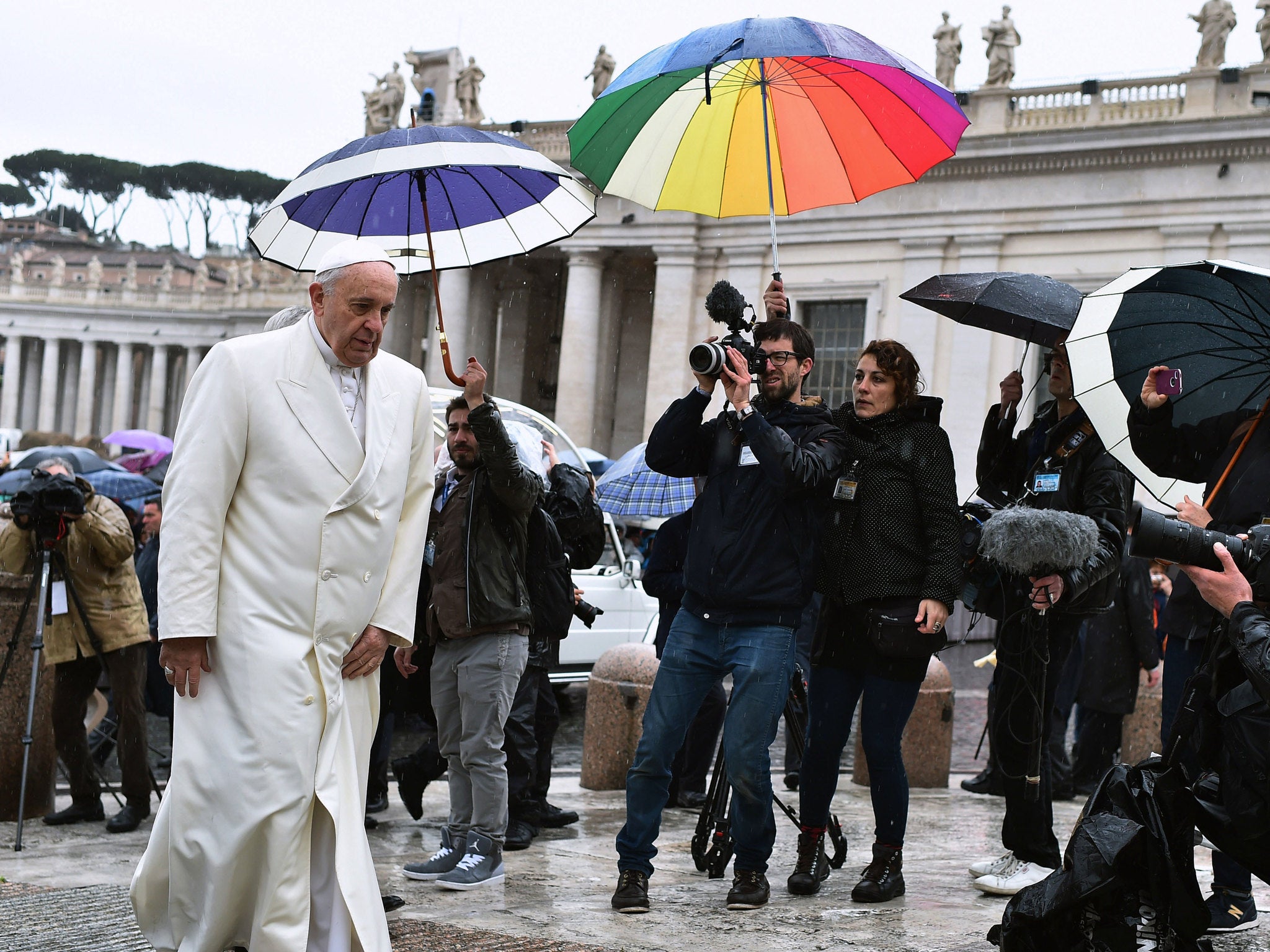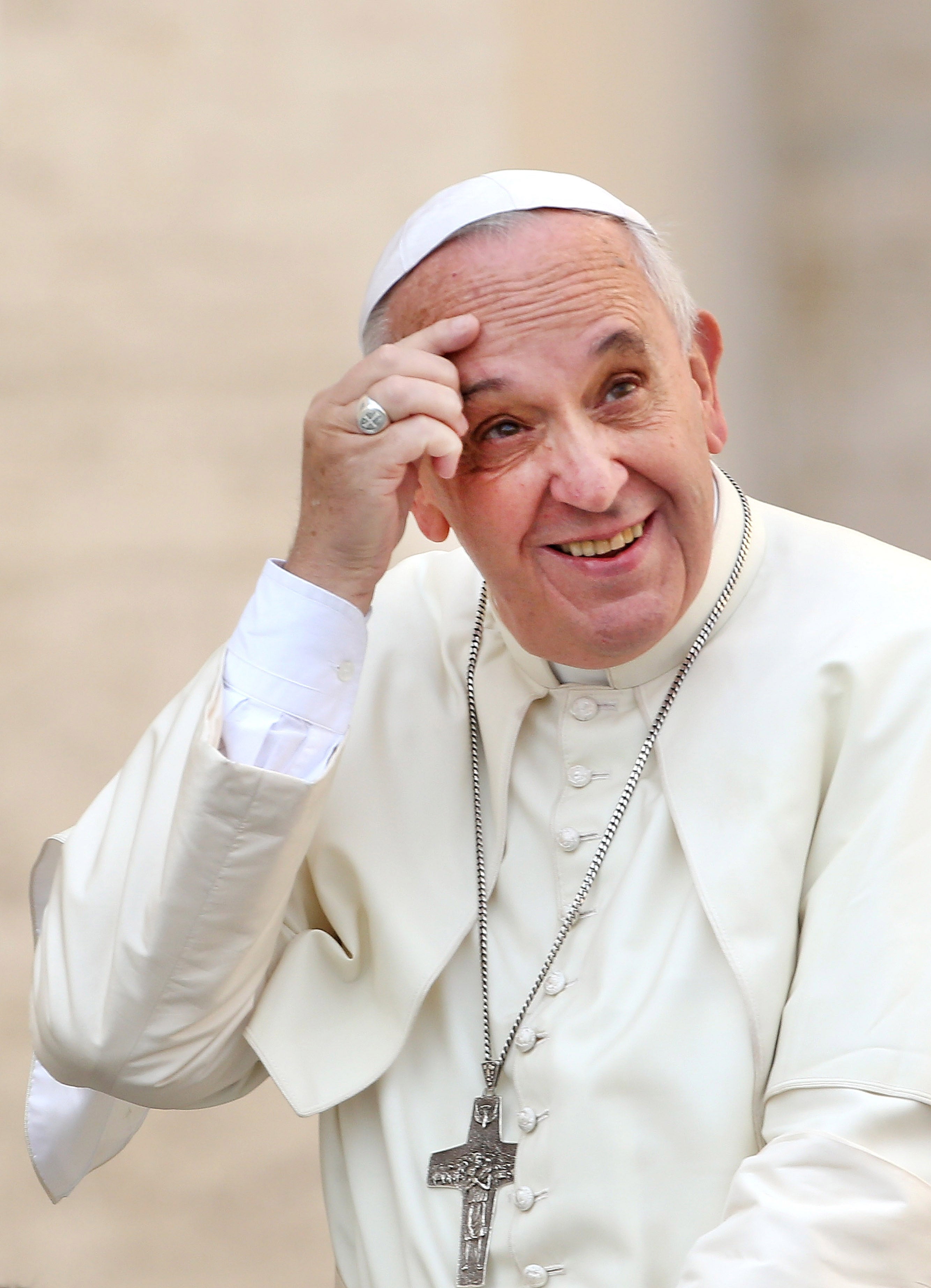How climate-change doubters lost a papal fight

Your support helps us to tell the story
From reproductive rights to climate change to Big Tech, The Independent is on the ground when the story is developing. Whether it's investigating the financials of Elon Musk's pro-Trump PAC or producing our latest documentary, 'The A Word', which shines a light on the American women fighting for reproductive rights, we know how important it is to parse out the facts from the messaging.
At such a critical moment in US history, we need reporters on the ground. Your donation allows us to keep sending journalists to speak to both sides of the story.
The Independent is trusted by Americans across the entire political spectrum. And unlike many other quality news outlets, we choose not to lock Americans out of our reporting and analysis with paywalls. We believe quality journalism should be available to everyone, paid for by those who can afford it.
Your support makes all the difference.Pope Francis was about to take a major step backing the science behind human-driven global warming, and Philippe de Larminat was determined to change his mind.
A French doubter who authored a book arguing that solar activity — not greenhouse gases — was driving global warming, de Larminat sought a spot at a climate summit in April sponsored by the Vatican’s Pontifical Academy of Sciences. Nobel laureates would be there. So would U.N. Secretary General Ban Ki-moon, U.S. economist Jeffrey Sachs and others calling for dramatic steps to curb carbon emissions.
After securing a high-level meeting at the Vatican, he was told that, space permitting, he could join. He bought a plane ticket from Paris to Rome. But five days before the April 28 summit, de Larminat said, he received an e-mail saying there was no space left. It came after other scientists — as well as the powerful Vatican bureaucrat in charge of the academy — insisted he had no business being there.
“They did not want to hear an off note,” de Larminat said.
The incident highlights how climate-change doubters tried and failed to alter the landmark papal document unveiled last week — one that saw the leader of 1 billion Catholics fuse faith and reason and come to the conclusion that “denial” is wrong.
It marked the latest blow for those seeking to stop the reform-minded train that has become Francis’s papacy. It is one that has reinvigorated liberal Catholics even as it has sowed the seeds of resentment and dissent inside and outside the Vatican’s ancient walls.
Yet the battle lost over climate change also suggests how hard it may be for critics to blunt the power of a man who has become something of a juggernaut in an institution where change tends to unfold over decades, even centuries. More than anything, to those who doubt the human impact of global warming, the position staked out by Francis in his papal document, known as an encyclical, means a major defeat.
“This was their Waterloo,” said Kert Davies, executive director of the Climate Investigations Center, who has been tracking climate-change deniers for years. “They wanted the encyclical not to happen. And it happened.”
Papal advisers say Francis signaled his intent to draft a major document on the environment soon after assuming the throne of St. Peter in March 2013. His interest in the topic dates to his days as a bishop in Buenos Aires, where Francis, officials say, was struck by the effects of floods and unsanitary conditions on Argentine shantytowns known as “misery villages.”
In January, Francis officially announced his goal of drafting the encyclical — saying after an official visit to the Philippines that he wanted to make a “contribution” to the debate ahead of a major U.N. summit on climate change in Paris in December.
But several efforts by those skeptical of the scientific consensus on climate change to influence the document appear to have come considerably later — in April — and, maybe, too late.
In late April, the Chicago-based Heartland Institute, a free-market group that serves as a hub of skepticism regarding the science of human-caused global warming, sent a delegation to the Vatican. As a Heartland news release put it, they hoped “to inform Pope Francis of the truth about climate science: There is no global warming crisis!”
It was meant to coincide with the same April meeting that de Larminat was trying to attend. Heartland’s activists were not part of the invited contingent, either, Heartland communications director Jim Lakely said.

“It was a side event,” he said. “We were outside the walls of the Vatican. We were at a hotel — literally, I could throw a football into St. Peter’s Square.”
Seven scientists and other experts gave speeches at the Heartland event, raising doubts about various aspects of the scientific consensus on climate change, even as several also urged the pope not to take sides in the debate. It’s impossible to know how that influenced those in the Vatican working on the pope’s document — which one Vatican official said was at “an advanced stage.” But Lakely said his group did not see much of its argument reflected in the final document.
“We all want the poor to live better lives, but we just don’t think the solution to that is to restrict the use of fossil fuels, because we don’t think CO2 is causing a climate crisis,” Lakely said. “So if that’s our message in a sentence, that message was not reflected in the encyclical, so there you go.”
One member of the Heartland delegation was E. Calvin Beisner, a theologian and founder of an evangelical group called the Cornwall Alliance for the Stewardship of Creation. In April, the group launched an “open letter” to the pope, signed by more than 100 scholars and theologians, arguing that climate-change models “provide no rational basis to forecast dangerous human-induced global warming, and therefore no rational basis for efforts to reduce warming by restricting the use of fossil fuels or any other means.”
Beisner said he thinks that “between a quarter and a third” of the signers were Catholic. He said he is not totally unhappy with the pope’s encyclical — he appreciates the sections on the need to help the poor and “the sanctity of human life.” But as for the climate section, he said, Francis is “writing in an area that is not his own background, and it looks to me as if he was poorly served by his adviser.”
Based on the people he recently appointed to his council for science, Francis was also seen to have made up his mind on the question of global warming. Some prominent conservatives — particularly economic and environmental conservatives — were consulted by the Vatican during the process, but “many were sort of shocked that none of their contributions made it in there,” Raymond Arroyo, news director at the Catholic mega-channel EWTN, said Friday.
Instead, the pope sought to build on the progressive environmental platforms established by his immediate predecessors, Benedict XVI and John Paul II. For advice, he turned to a number of scientific advisers who support the consensus that human activity is warming the Earth. They included Hans Joachim Schellnhuber, founding director of the Potsdam Institute for Climate Impact Research in Germany.
A professed atheist, Schellnhuber nevertheless saw a chance for a massive coup in the climate debate if a sitting pope issued an ode to Earth and the ills of carbon emissions. But not everyone, he said, seemed to want the encyclical to take sides.
He said he was stunned to hear that de Larminat, the French doubter, almost made it to the key Vatican climate summit in April. To him, it showed that “even within the Vatican, there were some people who would like to see something that presented both sides.”
De Larminat had a cordial meeting in March with Cardinal Peter Turkson, a senior member of the clergy and a key supporter of the pope’s encyclical. At the meeting, both men said, Turkson promised to try to secure a space for the Frenchman at the April summit.
However, Bishop Marcelo Sánchez Sorondo, chancellor of the Pontifical Academy of Sciences — a body of luminaries, religious and not, dating back decades but with roots in the 17th century — effectively vetoed de Larminat's presence. Asked why, Sánchez Sorondo responded in an e-mail, “because he’s not an academic authority in this field, neither a religious authority nor a U.N. authority.”
Turkson, however, said that he was told only that the summit was “well overbooked.”
During Francis’s 27 months as pope, something of a conservative resistance has formed to his more progressive tone. It particularly showed itself during fierce theological debates in October that saw conservatives successfully scrap language in a church document that would have recognized “the gifts and qualities” of gay people.
Some conservatives, including U.S. Cardinal Raymond Burke, have publicly denied a rift with the pope while also openly warning of a liberal strain coursing through the church. And a number of leaks in the Italian news media — including of the encyclical itself — have sparked a flurry of intrigue over possible conspiracies inside the Vatican.
Luigi Vicinanza, editor of the magazine L’Espresso, which published the leaked draft of the encyclical, said he had personally obtained it from a source. He would not identify the source but said he did not think the person was “out to harm the pope.”
Still, some pope watchers blame several leaks on an anti-Francis cabal inside the Vatican walls. Others say that not enough evidence has emerged to pin the leaks on a specific agenda.
Sánchez Sorondo, however, denied that there had been significant internal opposition to the pope’s encyclical. He insisted that rather than from inside Vatican City, the primary pressure against its message had come from climate-change deniers — particularly in the United States.
“But it is clear that this pope is very courageous,” said Sánchez Sorondo, who, like Francis, is an Argentine. “He is not a politician. He is not a diplomat. He is someone who is willing to say what others are afraid to say.”
Mooney reported from Washington. Michelle Boorstein in Washington, Virgile Demoustier in Paris and Stefano Pitrelli in Rome contributed to this report.
Copyright: Washington Post
Join our commenting forum
Join thought-provoking conversations, follow other Independent readers and see their replies
Comments